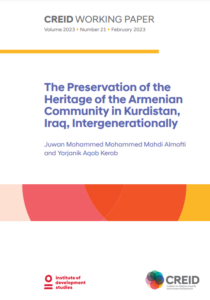Today, on Earth Day, global leaders are meeting to (hopefully) take decisive and urgent action at US President Biden’s climate change summit. A new short film by Earthlife Africa and the Southern African Faith Communities’ Environment Institute (SAFCEI) explores the important link between the environment and freedom of religion or belief. As the climate changes, fuelled in part by the extractive industry, heritage and spiritual practices tied to the land are forced to adapt, or else are lost to an environment that no longer has the capacity to support them alongside the demands of utilising fossil fuels.
When we consider freedom of religion or belief (FoRB) and its violators, less attention has been paid to the responsibility, and culpability, of the private sector in either the promotion or violation of FoRB.
This short film, entitled “Mapping the Sacred“, draws on research supported by the IDS-led Coalition for Religious Equality and Inclusive Development (CREID) exploring the impacts of the Eskom Matimba and Medupi coal-fired power stations in Lephalale, South Africa, which have dispossessed local communities, violating their religious freedom through preventing access to gravesites and water.
The impact of coal on the practice of traditional beliefs
Heritage, culture and customs can be rooted in the landscape, and coal, undisputedly destructive for the environment through pollution, changing land use and the water consumption it takes to produce it, has also been destructive for FoRB.
In Lephalale, which hosts two of South Africa’s largest coal-fired power stations, Matimba and Medupi, supplied by the Exxaro Grootegeluk coal mine 16 miles (25km) outside the town, the communities’ relationship with the land and ability to practice their traditional religious beliefs has been massively affected. In particular, the drying up of natural streams, which have been diverted away from villages to service the coal developments, are preventing practices such as baptisms and the collection of water for African traditional healing ceremonies.
Earthlife Africa, which has been working on environmental justice issues with communities in the Waterberg district of Limpopo in South Africa since 2009, has taken an intersectional lens, beyond traditional environmental and economic impact analysis, to also explore the effects of the coal mining industry on FoRB, with a particular focus on Lephalale and the power stations owned by Eskom, the largest producer of electricity in Africa.
Their participatory research with local communities indicates that community members were not sufficiently consulted about the ongoing coal development, and while there was promise of economic stimulus for the local area and increased job opportunities, in reality the projects have entrenched poverty in Lephalale and the surrounding province of Limpopo, with the resultant air and water pollution also having significant impacts on the health and wellbeing of local people.
In Mahlakung, an informal settlement established in 2003 on land owned by Eskom, there is no electricity and a few communal taps serve around 2,000 residents. As the land is privately owned, the municipality cannot provide access to basic services, and residents are stuck without sufficient access to running water, imperative for health, spiritual practices and wellbeing.
The researchers also found that the removal of ancestral graves during the development of the Medupi Power Station in Lephalale was a sensitive issue for communities. Some graves, which are located within the grounds of the station, are subject to lock and key, meaning that residents are forced to make appointments, variably granted, to pay respect to their ancestors.
Earthlife Africa and SAFCEI’s research paper, which will be published in a forthcoming CREID book, situates the importance of land and its sacred ties for belief and spiritual practices, building evidence towards the under-researched intersectionality of the environment and FoRB for marginalised cultural and religious minorities in South Africa. In the case of the coal developments in Lephalale, the environmental impacts also amount to FoRB violations, and the energy giants Eksom and Exxaro are directly culpable.
This blog draws on the paper ‘Sustainable Faith and Livelihoods: Promoting Freedom of Religion or Belief in Development’, written by Rifqah Tifloen of Earthlife Africa and Matome Makgoba of SAFCEI, which will be published as part of the forthcoming CREID collection ‘What about us?: Global perspectives on redressing religious inequalities’, a compilation of pioneering case studies and analyses of FoRB in practice by practitioners, researchers and activists across three continents.

